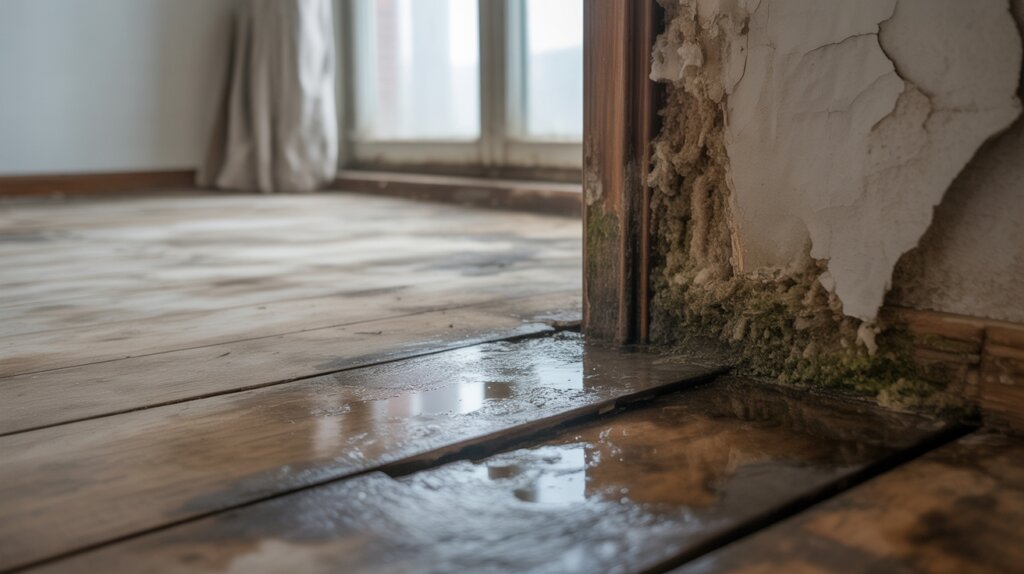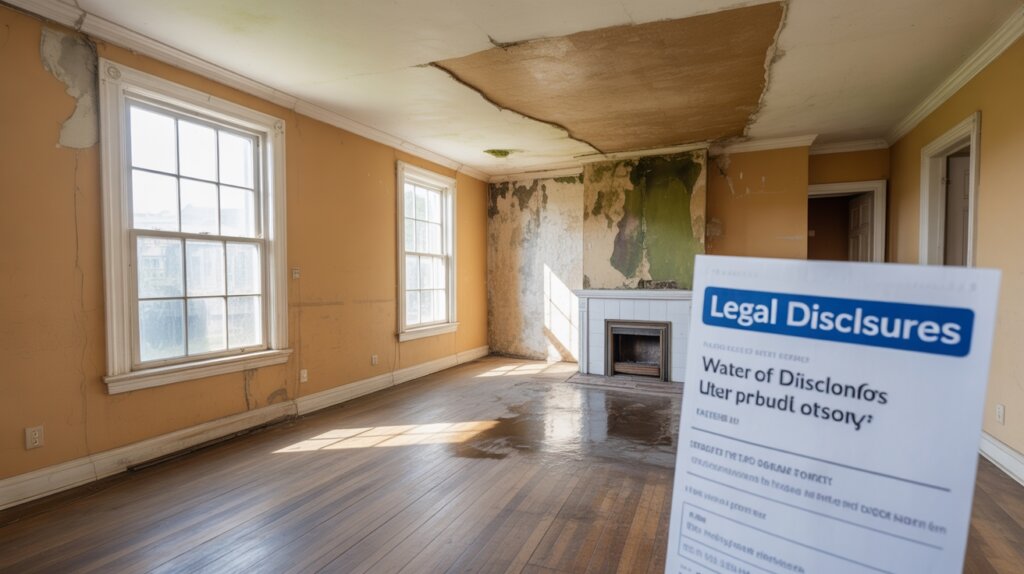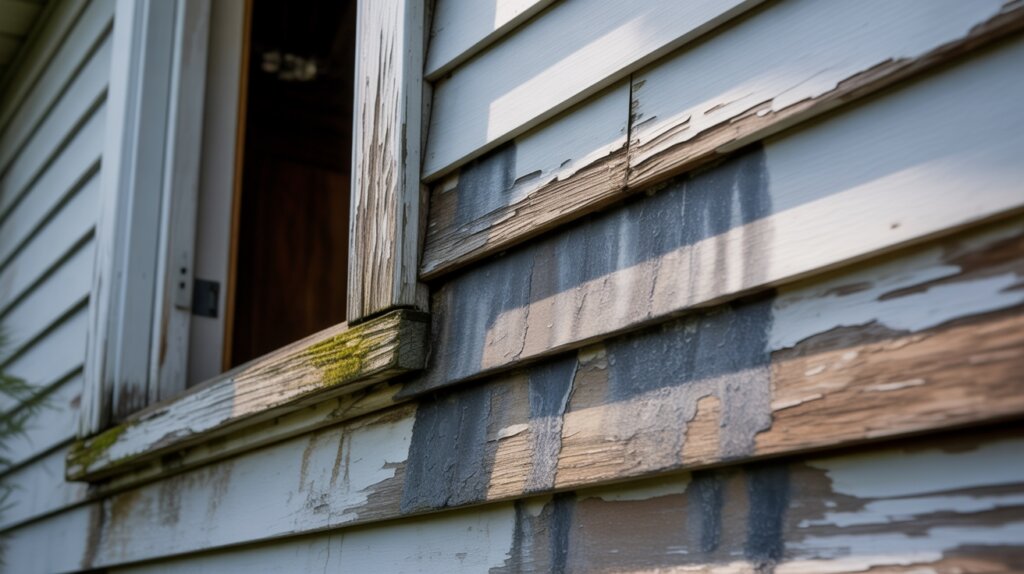When selling a house, water damage is a serious issue that many homeowners face. Buyers worry about hidden problems and future repairs. Sellers risk legal trouble if they do not handle it properly.
Ignoring water damage can lead to angry buyers and lawsuits. State laws demand sellers tell buyers about any water issues. If you hide problems, you might face fines, contract cancellations, or court cases. You must legally disclose all known water damage to buyers to avoid lawsuits and penalties.
To protect yourself, learn what you must share and follow the rules. This blog will help you understand your responsibilities and avoid costly mistakes. This blog will guide you step by step so you can sell your house with confidence and peace of mind.
Key Takeaways
- Sellers are legally required to disclose known water damage and past repairs on state-mandated disclosure forms.
- Failure to disclose water damage can lead to lawsuits, financial penalties, and possible cancellation of the sale.
- Mold and ongoing water issues must be reported, as they are considered material defects affecting value and safety.
- Professional inspection reports help document damage and ensure compliance with disclosure laws.
- Using licensed contractors for repairs and keeping records protects sellers against future legal claims.
Understanding Water Damage and Its Impact on Property Value

Water damage can lower your property’s value. It also creates legal challenges when you try to sell your home. Buyers pay close attention to water problems, especially in flood-prone areas.
Water damage may cause mold, weaken structures, or lead to contamination. These issues make a home harder to sell and often lower its price. If water problems are not fixed, your property may not qualify for insurance or loans.
The Uniform Residential Appraisal Report and FHA rules require homes to be free from water issues. If buyers find hidden water damage, you could face legal trouble. You should always check for water damage and keep good records if you plan to sell. Recognizing signs of water intrusion early can help prevent further damage and liability.
State and Local Disclosure Laws for Water Damage
State and local laws require sellers to disclose water damage. These laws protect buyers and help them make informed decisions. Requirements differ by state and city. A thorough understanding of disclosure requirements can prevent legal complications and ensure compliance.
State laws often ask for written disclosure of water damage and water quality problems. For example, California law requires sellers to list known plumbing issues. Local rules may ask for more detailed information. If you do not follow these laws, you could face lawsuits or lose a sale. Some cities have extra forms or stricter rules. Real estate agents can explain local practices and help with disclosures.
Required Seller Disclosure Forms and Statements

You must complete all required state disclosure forms, accurately reporting any known water damage as a material defect under statutes such as the Uniform Property Condition Disclosure Act. Courts hold sellers liable if you fail to disclose conditions that substantially affect property value or pose safety risks.
If you neglect these obligations, you risk civil penalties, contract rescission, or even fraud claims under state law. Additionally, disclosing title issues can help prevent future legal complications and facilitate a smoother sale process. Proper disclosure is also essential when managing timelines and ensuring the sale aligns with market conditions to avoid potential legal disputes.
State Disclosure Requirements
State law sets the rules for what you must tell buyers about water damage. Each state has its own disclosure requirements. You must follow these rules when selling your house.
Sellers must report any past or current water damage, such as leaks or flooding. If the home is near a flood zone, you must disclose that. Some states also require you to share water contamination risks, like if the property is by a factory or old septic system.
You will often need to fill out a state-specific disclosure form. These forms are legal documents and must be accurate. Failure to follow these steps can lead to legal trouble.
Material Defect Obligations
If state law treats water damage as a material defect, sellers must disclose it. This is usually done using official forms set by law. You should complete a seller disclosure form, like the Transfer Disclosure Statement in California.
Water leaks, mold, or similar issues are considered material defects. These problems can lower property value or make a home unsafe. Courts have confirmed that these types of damage must be reported.
If you leave out details about repairs or ongoing leaks, you break the law. Sellers must mention all known water damage, even if it was fixed. Always check your state’s rules to make sure your disclosure is complete.
If you are unsure about what to report, review your state’s statutes or ask a real estate professional. Proper disclosure protects both sellers and buyers. It also helps prevent legal problems after the sale.
Penalties for Non-Disclosure
If you do not disclose water damage, you can face legal trouble. State laws require sellers to share this information with buyers. Not following these rules leads to serious consequences.
A buyer may file a lawsuit against you for hiding water damage. The court can order you to pay money for losses or cancel the sale. If the court finds you acted on purpose, you may owe extra damages and legal costs.
State real estate commissions may also punish you. They can suspend or take away your real estate license. If you falsify disclosures on purpose, you could face criminal charges in some cases.
Identifying the Source and Extent of Water Damage

You must recognize common indicators of water damage, such as staining, musty odors, or warped materials, to fulfill your disclosure obligations under statutes like Cal. Civ. Code § 1102. Proper documentation of these signs and the extent of damage can help avoid future legal claims related to nondisclosure or misrepresentation, especially when structural damage has compromised the home’s integrity.
Additionally, understanding window replacement ROI and the cost implications of repairs can inform your disclosure and repair decisions, ensuring transparency and compliance during the sale process.
Common Water Damage Indicators
Common water damage indicators are signs that help you spot possible water problems in a home. Sellers must know these signs and tell buyers to follow the law. If you catch them early, you can prevent bigger damage or fix old problems before selling.
Stains or brown marks on ceilings and walls often mean there has been a leak. Warped or lifted floors show that water has gotten under the surface. If you notice these, you should check for hidden water issues.
A musty smell in a room can mean water has been there a long time. Peeling paint or wallpaper may also mean there is moisture behind the wall. Noticing these signs helps you protect your property and meet legal requirements.
Professional Inspection Importance
A professional inspection is important for finding the true cause and scope of water damage. Surface signs are not enough to understand the full problem. If you rely only on what you see, you may miss hidden issues.
Inspectors use special tools to find leaks and check past plumbing work. Their reports show if the damage is from ongoing problems or just one event. If you want to sell a property, you need this information.
State laws, like California Civil Code § 1102, require sellers to share all known defects. A full inspection helps you meet these legal rules. If you get a professional evaluation, you show honesty and reduce your risk as a seller.
Assessing Structural Impact
Water damage can weaken a home’s structure. If you are selling, you must check how much damage there is and where it started. This helps you meet legal rules like California Civil Code §1102.
You should not just look for obvious problems. A proper check helps you avoid hiding issues from buyers. Missing damage can lead to legal trouble later.
Start by finding where the water came from, such as leaks or broken pipes. Write down which parts of the home are affected. Check for signs of mold or rot, as these can mean bigger problems.
If you are unsure, contact a licensed inspector or engineer. Their reports can protect you if issues come up later. Always keep records of your findings and any repairs.
The Role of Home Inspections in the Sale Process
Home inspections are important in the sale of a house. They help find water damage that buyers or sellers might miss. If an inspection is done, the inspector looks for signs like stains, warping, or mold. Selling as-is properties often rely heavily on accurate inspections to inform buyers of the current condition. Proper inspection reports can also prevent future legal disputes related to undisclosed issues.
A home inspection is standard in real estate sales. It also meets the legal requirement to disclose problems in most states. For example, California Civil Code §1102 requires sellers to share known issues.
Inspection reports give buyers important information about the property’s condition. These reports can change the price or contract terms. If sellers do not fix problems, they may face legal trouble later.
The inspection process helps keep the sale open and honest. It protects both buyers and sellers from future disputes. If all parties follow the process, the sale is more likely to go smoothly. Additionally, understanding property condition through inspections supports transparent negotiations.
Repairing Water Damage: What Sellers Need to Know
You must thoroughly assess the full extent of water damage before making repairs, as incomplete remediation can lead to future liability under state disclosure laws (see Cal. Civ. Code § 1102). It’s essential to hire licensed contractors experienced in water damage restoration to ensure all work meets building codes and legal standards.
Proper documentation of repairs and using qualified professionals can help protect you from potential claims of fraud or misrepresentation. Additionally, understanding the repair and inspection process can help sellers evaluate options for financing repairs or facilitating the sale.
Assessing Scope of Damage
Water damage can be minor or severe. Sellers must assess the damage carefully to fulfill legal and insurance requirements. Accurate assessment helps sellers comply with disclosure laws and avoid future problems.
You should check all damaged areas, such as walls, floors, and ceilings. Mold or mildew can reveal hidden moisture issues. If you notice these signs, further investigation may be necessary.
Take clear photos and keep written records of all damage. These documents may support your insurance claim. You should also review your state’s disclosure laws to understand your responsibilities.
Choosing Qualified Contractors
You must choose qualified contractors to repair water damage properly. Licensed and reputable contractors help ensure repairs follow the law. If you hire unlicensed or uninsured workers, you may face legal problems.
Homeowners must check contractor licenses and insurance before hiring. You should also make sure contractors follow local building codes. If you skip these steps, you risk legal issues under California Civil Code §1102.
Always get a written contract before work starts. The contract should list the job details and guarantees. You also need to confirm that all permits are in place.
If you follow these steps, you protect your property and legal rights. Using qualified contractors helps maintain your home’s value. It also lowers the risk of costly mistakes.
Mold Issues and Legal Liability
If water damage causes mold in your home, you could be legally responsible. Mold can harm health and lower your property’s value. State laws usually require you to tell buyers about any mold issues you know about.
If you do not disclose mold problems, buyers might sue you for hiding important information. Courts often rule in favor of buyers in these cases. You may have to pay for damages if someone gets sick from mold exposure.
You should fix any mold issues before putting your home up for sale. Always keep records of any repairs or mold removal you do. Proper documentation can help show you acted honestly.
Most states have laws that make you tell buyers about any water or mold damage. If you follow these laws and fix mold problems, you lower your legal risks. If you ignore the problem, you could face lawsuits or financial penalties.
Working With Real Estate Agents When Water Damage Is Present
When you work with a real estate agent, you’re both bound by state disclosure laws—most notably, statutes like California Civil Code § 1102, which mandate full transparency about known water damage. Your agent must guide you on what to disclose and help you negotiate with buyers regarding repair obligations.
Failing to meet these legal standards can expose both you and your agent to significant liability. Ensuring a clear title is also essential to avoid future legal conflicts and facilitate a smooth transaction process. Additionally, understanding the property’s financial status, including any liens or judgments, can impact disclosure requirements and the sale process.
Agent Disclosure Requirements
Agents must tell buyers about any water damage in a home. Laws require agents to share all known problems before selling. This includes leaks, floods, or any signs of water issues.
Agents should provide all inspection reports about water damage. If repairs were made, agents must show proof of these efforts. All information should be given to buyers as soon as possible.
State laws may have different disclosure rules. Agents must follow these specific rules for each state. Not following these rules can cause legal problems.
Buyers need to know about any water-related issues before buying. Clear communication protects both the buyer and the agent. If agents hide water damage, they may face legal action.
Negotiating Repair Responsibilities
If a home you are selling has water damage, you must decide who will pay for repairs. The purchase agreement should state repair responsibilities. This helps avoid confusion later in the process.
California law requires you to tell buyers about any water damage you know about. Buyers may ask you to repair the damage or offer a credit. Your real estate agent can help you negotiate these terms.
You might agree to fix the damage before closing if the buyer requests it. If the buyer prefers, they may accept the property “as is” for a lower price. Always write down any agreements to prevent misunderstandings.
If you are unsure about your legal duties, you should talk to a lawyer. This ensures you follow state and local real estate rules. Proper legal advice protects you during the sale.
Buyer’s Rights and Legal Remedies
Buyers have important legal rights if a seller hides water damage. State and federal laws require sellers to tell buyers about major defects. If a seller does not disclose water damage, buyers can take legal action.
You may be able to cancel the contract and get your deposit back. If you have losses, you could ask for money to cover repairs or lost value. Courts may order the seller to follow the contract if needed. Proper disclosure procedures are crucial to ensure transparency and avoid legal disputes.
You can also sue for fraud if the seller lied about property damage. Punitive damages may be possible in serious cases. Always speak to a real estate lawyer to protect your rights.
Insurance Claims and Coverage for Water Damage
Insurance may cover water damage in a house, but there are important limits. Most standard homeowner’s policies only pay for sudden and accidental water damage. They do not cover damage from old leaks, neglect, or flooding. Understanding closing costs is essential because these expenses can affect your overall financial picture when selling. Flood damage usually needs a separate flood insurance policy.
This coverage is often available through the National Flood Insurance Program (NFIP). If your house had water damage, check your policy to see what is included. If you file a claim, you must tell buyers about it and any repairs made. State laws and insurance rules require this disclosure. Good records of insurance claims and repairs help you meet your legal duties when selling.
The Importance of Full Disclosure to Avoid Lawsuits
Full disclosure is important to avoid lawsuits when selling your home. State laws require sellers to share any known water damage. If you do not disclose this, you risk legal trouble.
Buyers have the right to know about past flooding or if the home is in a flood zone. Sellers should also share water test results that show damage or contamination. Courts often support buyers if sellers hide important facts.
Written disclosures must list all past and present water issues. You should state if the property is in a flood zone. If you have water testing results, you must share those as well.
Keep records to prove you shared all information. If you are honest now, you can avoid legal problems later.
Negotiating Repairs and Sale Terms With Buyers
Negotiating repairs and sale terms with buyers means discussing who will fix the water damage and under what conditions. Buyers may ask you to make repairs, lower the price, or offer other concessions. You must be clear about what you are willing to do.
Check your state’s disclosure laws and review the sales contract carefully. Some agreements set deadlines and define repair responsibilities. If you are unsure, consider asking a real estate agent or lawyer for help.
Water damage can lower your property’s value. Buyers may negotiate more if the damage is serious or affects safety. If you have repair estimates from licensed contractors, use them to support your position.
Always put any agreement in writing to avoid confusion later. Clear communication helps prevent misunderstandings. Following the rules protects your interests and makes the sale process smoother.
Consequences of Failing to Disclose Water Damage
If you do not tell buyers about water damage, you may face serious legal and financial problems. Most states require sellers to share known issues with buyers. Hiding water damage can be seen as dishonest and illegal.
Buyers may sue you for not sharing this important information. Courts might order you to pay for repairs or other costs. If the judge decides, you may have to take back the house.
Real estate boards can also punish dishonest sellers. Your reputation as a seller could suffer. Future sales may become more difficult if your record shows past problems.
Best Practices for Documenting Repairs and Disclosures
You should keep clear records of all repairs and communications about water damage. Good documentation helps you meet legal requirements and avoid trouble later. Include repair receipts, contractor notes, and photos with dates.
If you file an insurance claim, save copies of all paperwork. This includes adjuster reports and settlement details. Attaching these to your disclosure statement shows you are being honest.
California law, like Civil Code §1102, requires sellers to disclose water damage. Proper records prove you shared all important facts. If you do this, you lower your risk of disputes after the sale.
Full transparency protects you from future claims. If you have doubts, ask a professional for advice. Good records show you acted in good faith.
Conclusion
If you plan to sell a house with water damage, you should always be open and honest about any problems. Full disclosure can help you avoid legal trouble and build trust with buyers. Proper documentation and following the law keep the process smooth.
If you are worried about repairs or legal risks, you can consider selling your home for cash. We buy houses for cash in any condition, including those with water damage. This option can save you time and stress.
If you want a fast and easy sale, we at OC Real Estate are here to help. Contact us today to discuss your options. We can offer you a fair cash price and a simple selling process.

